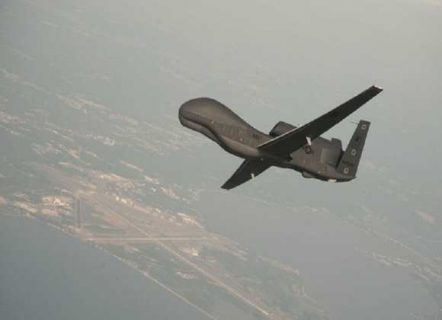Iran’s Deliberate ‘Big Mistake’

Tehran is trying to warn Trump against being dragged into war
Thursday’s downing of an American drone by an Iranian surface-to-air missile over the Strait of Hormuz brings the prospect of a military confrontation between Iran and the US, either limited or extensive, closer than ever.
President Donald Trump apparently tried to row back from such a confrontation by describing the incident as a “big mistake” and suggesting it may have been unintentional. That was after it drove oil prices up on world markets by six dollars in a matter of minutes, and prompted Tehran to place its armed forces on maximum alert.
But if the Iranians made a big mistake by shooting down the spy-plane, the Americans made an even bigger one by deploying it over such a volatile area – seething with tension after a spate of attacks on tankers and US allies’ infrastructure — and failing to anticipate the Iranian response. The immediate reaction of Revolutionary Guard (IRGC) commander Hosein Soleimany was to vow to resist any provocative violations of the country’s sovereignty from whatever source, and hint that it had other, tougher, means of retaliation it could use in future.
US commanders evidently thought the Iranians, who insist the drone was in their airspace, would not challenge it, just as they have avoided retaliating to repeated Israeli attacks on their forces in Syria. Perhaps the drone was sent up to test the Iranian response. Or maybe it was a deliberate provocation, and the Americans wanted it to be shot down to furnish a pretext for going to war. These are all possibilities.
Whatever the case, there is a big difference in Tehran’s eyes between violating sovereign Iranian airspace over Hormozgan province and hitting Iranian targets in Homs, Hama or Latakia, where Syria is the sovereign power and Iran’s forces only play a secondary back-up role. It is a matter of ordering priorities.
It seems clear that the decision to bring down the drone was not impetuous, but in line with a policy decision taken months ago to resist forcefully any violation, be it American or Israeli, of Iranian territory, waters or airspace. In other words, the finger was already on the trigger in anticipation of such an incursion.
Trump could be expected not to take this humiliation lightly and to order tough retribution. “You’ll find out”, he told reporters on Thursday when asked how he would respond. US retaliation could take the form of air or missile strikes on selected Iranian military or naval targets. The more important question, however, is how Tehran would respond in turn. Would it take the blow and engage with international efforts to de-escalate the situation, or hit back even harder, such as by targeting US warships or bases in the Gulf?
One can only speculate, but it seems obvious from recent events that the Iranian leadership is in no mood to surrender. It is unlikely to back down unless mediators convey it a US promise to lift sanctions and re-commit to the nuclear deal, which seems far-fetched in the current climate of high tension.
The US’ Israeli and Gulf allies have been exploiting Trump’s stupidity to try to drag him into a war against Iran on their behalf. The Iranians are trying to impress on him that any such war would incur an exorbitant cost on the US, and also on those allies – Hezbollah leader Hassan Nasrallah has warned that any war would not be confined to Iran but set the entire region ablaze.
Even if there is no direct US attack, the Iranians will not simply sit back and wait to be starved into submission by Trump’s embargo and halting of their oil exports. That is another thing the US president does not understand. And he may never understand it until he sees the extent of their retaliation against his country’s forces, warships and bases, and his allies’ cities, airports, and power and desalination plants.
https://www.raialyoum.com/index.php/irans-deliberate-big-mistake/
 TheAltWorld
TheAltWorld 
0 thoughts on “Iran’s Deliberate ‘Big Mistake’”